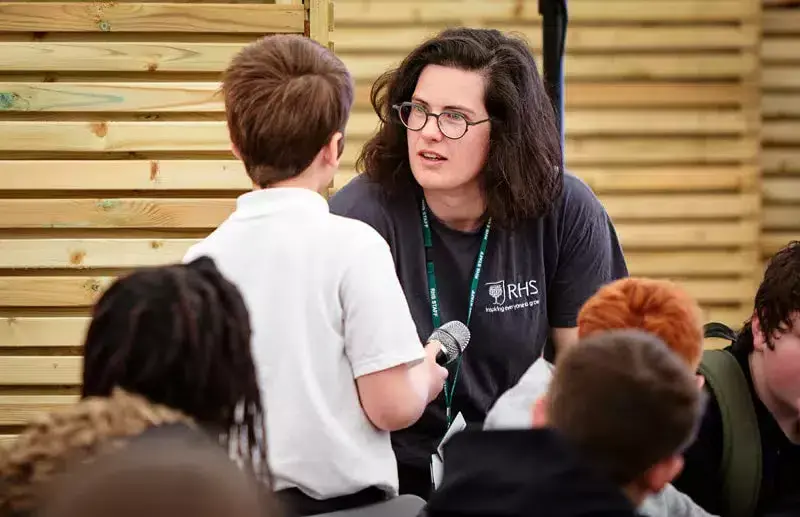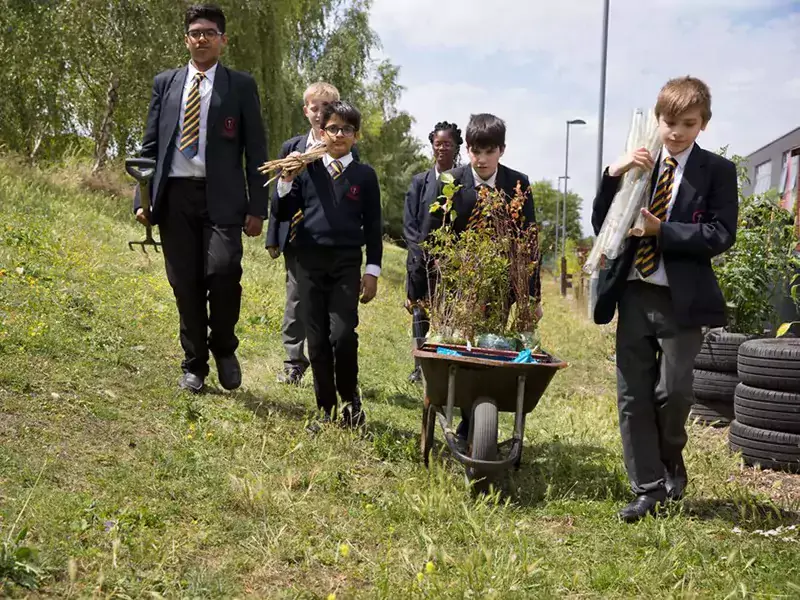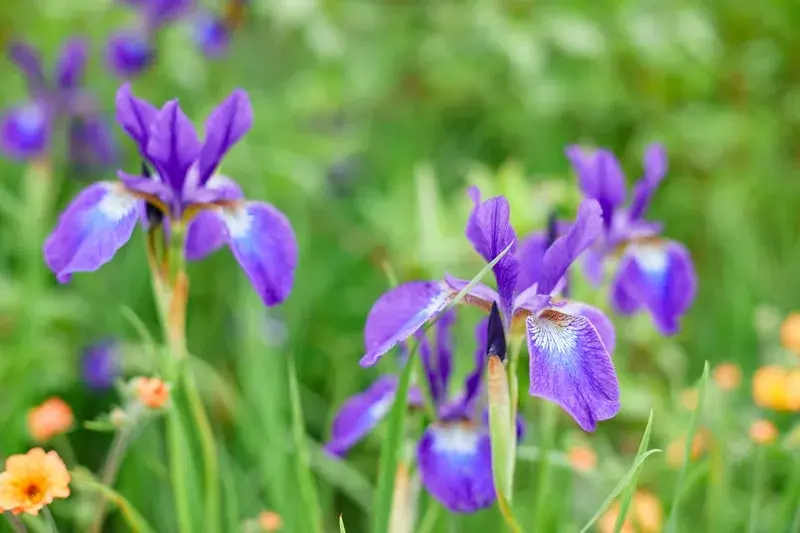Find help and local expertise
Following the programme's five-step process helps you and your learners work together to improve your outdoor areas for nature. Alongside the Nature Park resources, we have a wide network of help and support such as Nature Park regional officers and advice on external contractors to help you put your plan into action.


Nature Park regional officers
Get in touch with your local regional officers for support and advice on the Nature Park.
- North West — [email protected]
- North East — [email protected]
- Yorkshire and the Humber — [email protected]
- East Midlands — [email protected]
- West Midlands — [email protected]
- East of England — [email protected]
- London — [email protected]
- South East — [email protected]
- South West — [email protected]
For some tasks — perhaps digging a pond or building raised beds — you may need to bring in an external contractor or seek professional advice. There's also a vast network of local nature enthusiasts and growers who can advise you or help support your activities. Check out our considerations to think about when finding help as well as some useful organisations.


Before hiring external contractors consider the following:
- Have they worked in education settings before?
- Are DBS checks required for working on site?
- Are they a community-focused, socially responsible or environmental organisation who can bring added value to projects?
- Will they prioritise designing a space that's good for nature and your students, while continuing to function as multi-use?
- Can they support teachers and young people in engaging with the build process?
- Can they support the school estate team on maintenance plans?
- Does your Local Authority have an approved supplier list?
Request free support from these regional hubs
The National Education Nature Park works closely with the other initiatives in the DfE Sustainability and Climate Change Strategy to offer education settings in England support and ideas to develop and deliver climate action plans and strengthen local connections to sustainability networks. Climate Ambassadors are trained and DBS-checked volunteers and you can find out more or request free support by making contact with your Climate Ambassadors regional hub:
- North West — Manchester Metropolitan University — [email protected]
- North East — Newcastle University — [email protected]
- Yorkshire and the Humber — University of Leeds — [email protected]
- East Midlands — Universities for Nottingham — [email protected]
- West Midlands — Keele University — [email protected]
- East of England — University of East Anglia — [email protected]
- London — UCL — [email protected]
- South East — University of Reading — [email protected]
- South West — The Met Office — [email protected]
Climate Action Advisors are experts, who offer free support for schools, colleges, and nurseries across England. They support schools to understand their carbon impact, make effective plans, and find funding and resources. Find one here.
Find charities with design experience in biodiversity solutions for education settings
- https://www.treesforcities.org/our-work/schools-programme
- Trees for Cities' programme Trees for Schools aims to transform urban school grounds into leafy green oases for the children of today and tomorrow. Their projects include playground re-design with a year of engagement sessions to ensure the sustainability of new planting. They work with schools with high levels of deprivation and a lack of access to green space across the UK, with coordinators based in London, Cardiff, Bradford and Glasgow.
- https://www.groundwork.org.uk/themes/landscape-design-and-management/
- Groundwork are a federation of charities who support communities and individuals to take practical action to create a fair and green future. Their landscape architects and community engagement teams work closely with communities, schools and health providers to identify ambitions for local greenspaces and co-design solutions which enable people and nature to thrive. For more tips and inspiration follow them on social media or visit https://www.groundwork.org.uk/greening-community-spaces/
- https://ltl.org.uk/
- Learning Through Landscapes is a network of accredited professionals including designers and environmental educators, with a range range of skills and experience. They can advise on engaging pupils (from Early Years to secondary), in the design and change process as well as support the implementation and management of changes. Depending on the scale, they may need to bring in contractors.
- https://www.froglife.org/froglife-ecological-services/
- FrogLife are a national wildlife conservation charity with a team of experienced staff that offer ecological services and deliver conservation and education projects across the UK.
Find landscape architects, garden designers, arboriculturists and ecologist
- https://www.bali.org.uk/
- The British Association of Landscape Industries represents, supports and accredits the landscaping industry. It provides a database of accredited landscape contractors, garden designers and suppliers.
- https://my.landscapeinstitute.org/directory
- The Landscape Institute is a directory of registered practices and individuals who are chartered landscape architects. This includes designers, those who manage landscapes and landscape scientists, including ecologists.
- https://www.sgd.org.uk/
- The Society of Garden Designers can be used to find an accredited designer in your region.
- https://cieem.net/i-need/
- The Chartered Institute for Ecology and Environmental Management has a directory of registered practices and individual professional ecologists across the country who are experienced in creating, restoring and managing natural habitats.
- https://www.trees.org.uk/Find-a-professional
- The Arboricultural Association can help you to find a tree care professional
Finding local expertise and networks of growers
- https://www.checkatrade.com/
- Checkatrade provides a database that includes gardeners and other trades, such as joiners for raised beds.
- https://comminutywoodrecycling.org,uk/wood-stores/#wood-store-finder
- You can find your nearest community wood recycling store, stocking a wide range of reclaimed timber that can be used in Nature Park projects cheaply and sustainably.
- https://www.rhs.org.uk/get-involved/community-gardening/find-a-group
- The Royal Horticultural Society's community groups can connect you with your local community gardening groups. Search their map for Britain in Bloom, It's Your Neighbourhood groups and Affiliated Societies local to you.
- https://www.thegardenersguild.co.uk/
- The Gardeners Guild is a national trade network for professionally qualified gardeners. Their members are self-employed gardeners who offer garden and grounds maintenance as part of their services. Go to the Find a Gardener or Find a Consultant section where you can filter for wildlife gardeners.
The Royal Horticultural Society's Guide to Buying Plants has useful information on the following:
- peat-free nurseries and information on why peat-free is better https://www.rhs.org.uk/advice/peat/peat-free-nurseries
- buying plants at garden centres https://www.rhs.org.uk/garden-design/buying-garden-plants
- buying mail-order plants https://www.rhs.org.uk/garden-design/buying-mail-order-plants
- buying shrubs and trees https://www.rhs.org.uk/plants/types/trees/buying-trees-and-shrubs
- https://www.nsalg.org.uk
- The National Allotment Association is a great way to connect with your wider community and network of growers.Find a local group that may be able to give support and advice either on site at your school or at a nearby allotment to help you gain skills and knowledge. A great way to connect with your wider community network of growers.
- https://www.farmgarden.org.uk/
- Social Farms and Gardens allows you to find local community gardens and farms to build your local network and knowledge.


Funding improvements
Find out more about how you can fund the improvements you want to make.